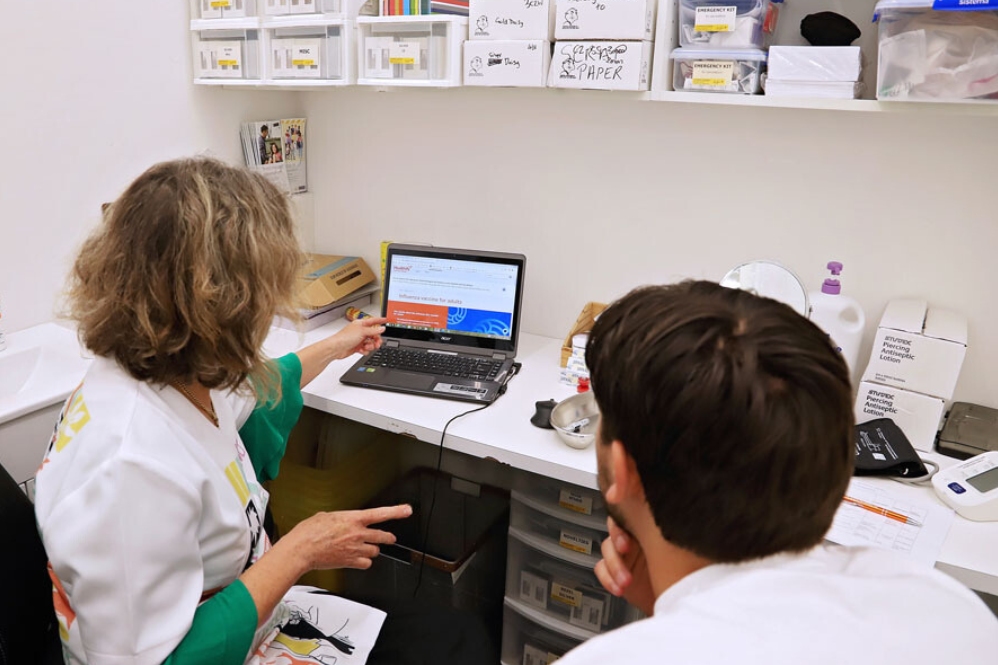Hepatitis A vaccine
Key points about hepatitis A vaccine
- The hepatitis A vaccine protects against infection from the hepatitis A virus.
- It is also known as Havrix 1440® or Havrix Junior®.
- Find out about the vaccine and possible side effects.

The hepatitis A vaccine gives protection against infection from the hepatitis A virus. The vaccine works by causing your body to produce antibodies against the virus responsible for hepatitis A infection and in this way protects (or provides immunity) against the disease.
The hepatitis A virus is carried in the faeces (poo) of an infected person. You can come into contact with this when you:
- drink contaminated water
- eat food prepared by someone with hepatitis A virus who didn't wash their hands after going to the toilet
- have sexual contact with someone with the virus.
Read more about hepatitis A.
Hepatitis A is uncommon in Aotearoa New Zealand but the vaccine is funded for people at risk of severe infection, including:
- transplant patients
- children with chronic liver disease
- people who live in close contact with someone infected with hepatitis A.
Immunisation is recommended but not funded for the following groups:
- adults with chronic liver disease including chronic hepatitis B or chronic hepatitis C
- men who have sex with men
- some occupational groups (eg, healthcare workers exposed to faeces/poo, employees of early childhood services, particularly where there are children too young to be toilet trained, sewage workers, those who work with non-human primates (eg, zoos, research laboratories)
- food handlers during community outbreaks
- military personnel who are likely to be deployed to high-risk areas.
Vaccination can be considered in others at higher risk, such as injecting drug users. Hepatitis A vaccine is not routinely recommended for all children in Aotearoa New Zealand, although it may be considered during community outbreaks.
Travelling overseas
If you're planning to travel to a developing country, you may be at risk of hepatitis A infection and should consider getting immunised.
- High-risk areas include Africa, Asia, Central and South America and the Middle East.
- Moderate-risk areas include the Mediterranean, Eastern Europe (including Russia) and parts of the Pacific.
The vaccine should be given at least 2 weeks before departure so that your body has time to respond to the vaccine.
Havrix 1440® and Havrix Junior® are vaccines that protect against hepatitis A.
- Havrix 1440 is the higher strength vaccine, used in people 16 years of age and older.
- Havrix Junior is the lower strength vaccine used in children 1 to 15 years of age.
These vaccines are given intra-muscularly (injected into the muscle) of the upper arm muscle in adults and older children, and into the thigh muscle in infants.
To get the full benefit of the hepatitis A vaccine, 2 doses of the injection are needed.
- After the first dose of hepatitis A vaccine, protection from hepatitis A lasts for at least 1 year.
- A second booster dose, given 6 to 12 months after the first dose, gives longer term protection. It's predicted that protection could last for 20 years.
Like all medicines, vaccines can cause side effects, although not everyone gets them.
| Side effects | What should I do? |
|---|---|
|
|
|
|
|
|
|
|
Read more about medicines and side effects and reporting a reaction that you think might be a side effect.
There are many different settings in which you can get a vaccination. These include medical or health centres, pharmacies, community-based clinics including marae-based clinics, mobile health clinics and mobile vaccination services.
Read more about who can give vaccinations and where to get vaccinated.
The following links have more information on hepatitis A vaccines:
- The New Zealand National Immunisation Schedule(external link)
- Tips following immunisation(external link) Health New Zealand | Te Whatu Ora
- Havrix(external link) Medsafe Consumer Information, NZ
- Twinrix(external link) Medsafe Consumer Information, NZ
- Hepatitis A vaccine information(external link) Centres for Disease Control & Prevention, US, 2011 Thai(external link), English(external link)
References
- Hepatitis A(external link) Health New Zealand | Te Whatu Ora
- Hepatitis A(external link) Immunisation Handbook 2024, version 5
- Hepatitis A(external link) The Immunisation Advisory Centre, NZ
- Havrix(external link) The Immunisation Advisory Centre, NZ
- Hepatitis A vaccine(external link) New Zealand Formulary
Brochures

Medicines and side effects
Healthify He Puna Waiora, NZ, 2024

Health Quality and Safety Commission, NZ, 2019 English, te reo Māori
Credits: Sandra Ponen, Pharmacist, Healthify He Puna Waiora. Healthify is brought to you by Health Navigator Charitable Trust.
Reviewed by: Angela Lambie, Pharmacist, Auckland
Last reviewed:
Page last updated:





